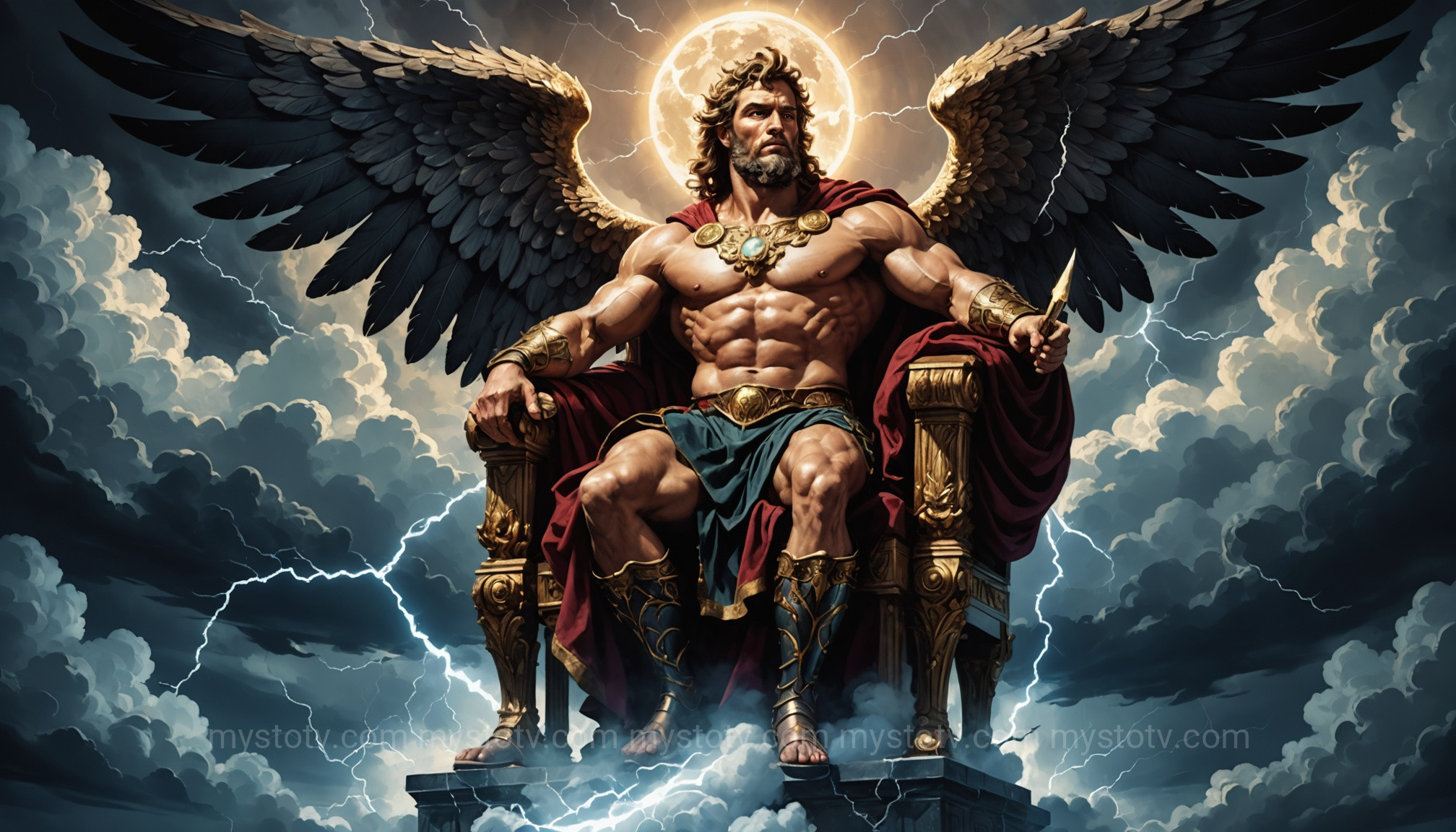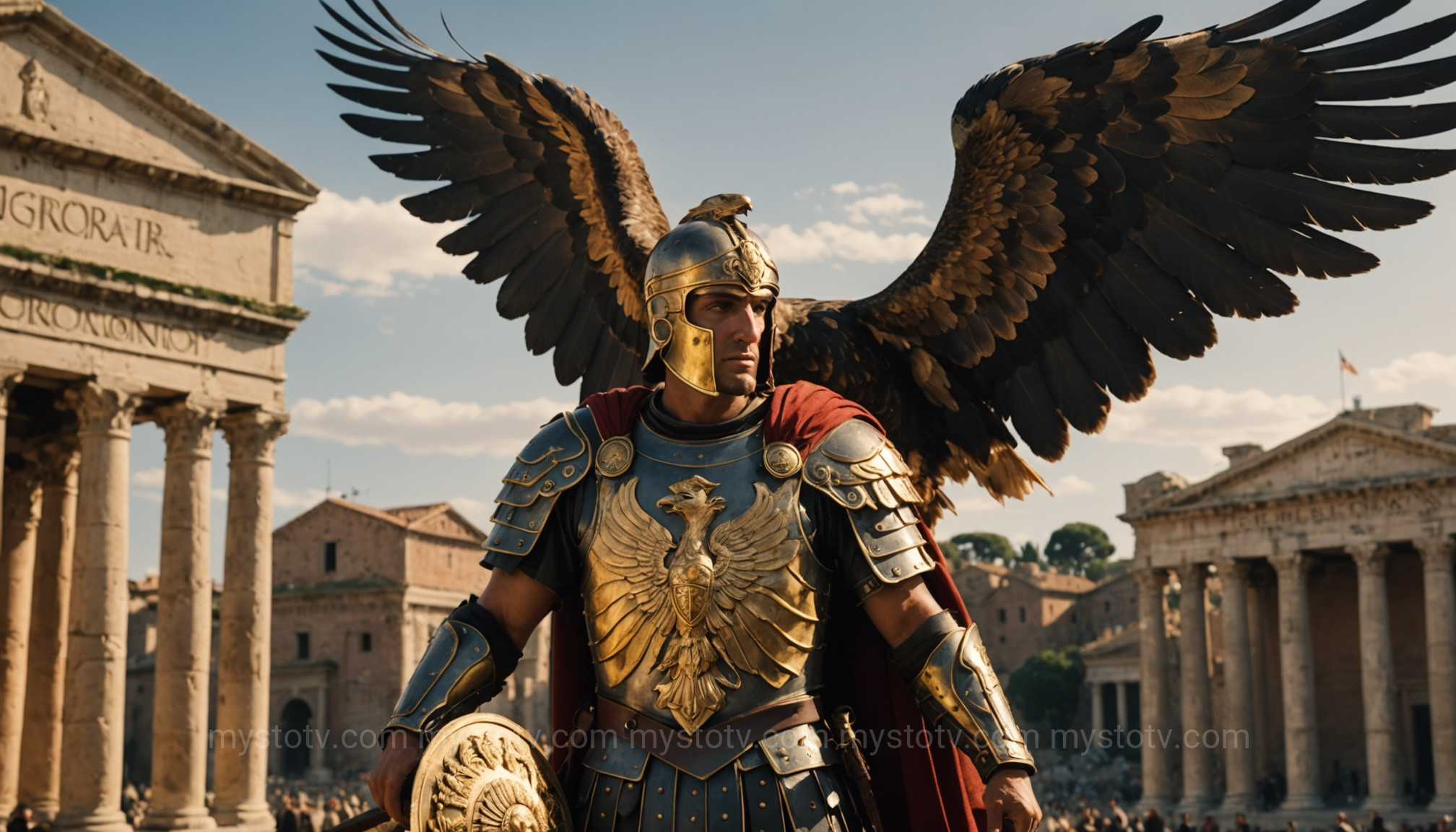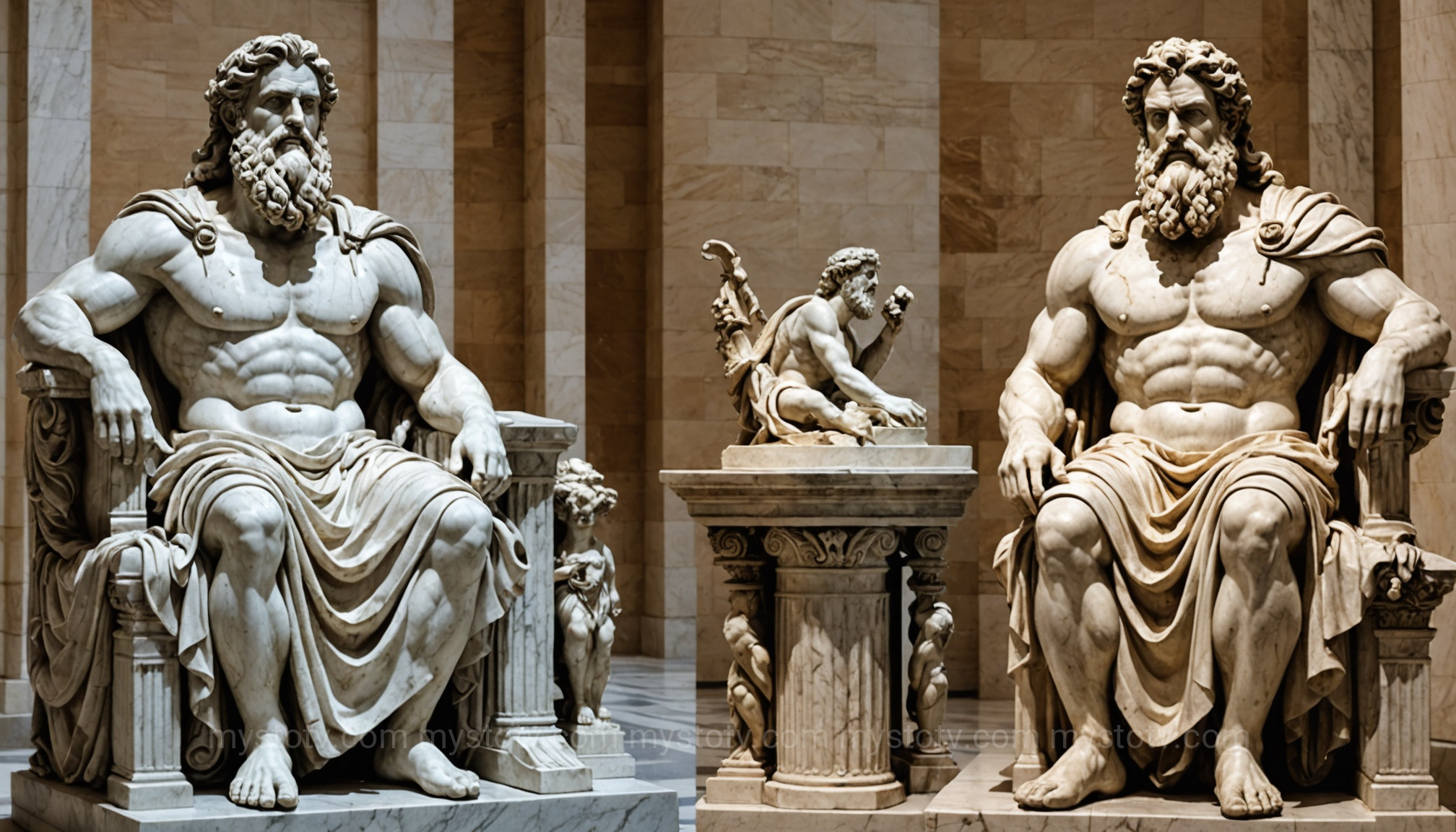I remember standing on my porch during a particularly fierce summer thunderstorm. The sky, a canvas of bruised purple and grey, was suddenly ripped open by a jagged fork of lightning, followed by a clap of thunder so deep it rattled the windows and my own bones. In that moment of raw, untamable energy, it was easy to understand why ancient civilizations looked at the heavens with such awe and reverence. For the Romans, this magnificent and terrifying power had a name: Jupiter. It was my first, visceral connection to understanding the sheer scale of the Roman god Jupiter powers, not as a dusty myth, but as a living explanation for the world's most dramatic forces. This wasn't just a story; it was a framework for comprehending majesty, authority, and the very fabric of the cosmos.
Contents
- 1 The Core of Roman God Jupiter Powers: Dominion Over Sky and Storm
- 2 Divine Authority and the Political Roman God Jupiter Powers
- 3 The Symbolism Behind the Roman God Jupiter Powers: The Eagle and the Thunderbolt
- 4 Jupiter's Prophetic Sight: Unveiling the Future with Roman God Jupiter Powers
- 5 Comparing Roman God Jupiter Powers with Zeus's Might: A Tale of Two Kings
- 6 Conclusion: The Enduring Legacy of the Roman God Jupiter Powers
The Core of Roman God Jupiter Powers: Dominion Over Sky and Storm

At the very heart of the Roman god Jupiter powers was his absolute command over the sky. He was not merely a resident of the heavens; he was the heavens. This domain granted him a suite of abilities that were the most visible and awe-inspiring to mortals, directly influencing their daily lives and shaping their perception of divine authority. His rule over the celestial realm was the foundation upon which all his other powers were built, establishing him as the undisputed king of the gods (Rex Deorum).
This dominion was more than just a title; it was a tangible, observable reality for the Roman people. The weather, a force that determined the success of harvests, the safety of sea voyages, and the general prosperity of the empire, was seen as a direct expression of Jupiter's mood and will. A clear, sunny sky was a sign of his favor, while a devastating storm was a mark of his wrath.
The Mighty Thunderbolt: Jupiter’s Divine Weapon and Symbol of Justice
The thunderbolt, or fulmen, is arguably the most iconic symbol of Jupiter's might. It was not just a weapon but an instrument of divine justice. When Jupiter hurled his lightning, it was believed to be a direct and decisive judgment. This power was tripartite, as described by ancient authors like Pliny the Elder. There was lightning that warned, lightning that punished by destroying property (like a tree or a building), and the ultimate lightning that took a life, representing a final, divine verdict. This belief meant that any place struck by lightning was considered sacred and taboo, a space directly touched by the king of the gods himself. The analysis here is clear: the thunderbolt solidified Jupiter's role as the ultimate arbiter, making his power not just physical but profoundly moral and judicial in the eyes of the Romans.
Controller of the Weather and Auspices
Beyond the thunderbolt, Jupiter’s control extended to all atmospheric phenomena. He could summon winds, command the clouds, and bring forth rain to nourish the crops of Rome. This aspect of the Roman god Jupiter powers made him a critical agricultural deity. Farmers would pray to Jupiter Pluvius (Jupiter as the bringer of rain) to ensure a bountiful harvest. Furthermore, his dominion over the sky made him the chief source of auspices—the practice of divining the future by observing the flight of birds. The sky was his canvas, and the patterns of eagles, vultures, and other birds were interpreted by priests (Augurs) as messages revealing his will regarding state matters, such as declaring war or electing officials. This power inextricably linked his atmospheric control with the political and military destiny of Rome.
Divine Authority and the Political Roman God Jupiter Powers
While his command of the sky was visually spectacular, the political dimensions of the Roman god Jupiter powers were what truly cemented his position as the supreme deity of the Roman state. Jupiter was not a distant, temperamental sky god; he was the divine guarantor of Rome's laws, social order, and imperial destiny. His authority mirrored and legitimized the authority of the Roman Senate and, later, the Emperor.
This connection was epitomized by his most important title: Jupiter Optimus Maximus, meaning "Best and Greatest." This wasn't just flattery; it was a political and religious statement. His temple on the Capitoline Hill was the heart of the Roman state religion. It was the final destination for triumphal processions, where victorious generals would give thanks to Jupiter for their success, reinforcing the belief that Rome's military might was divinely sanctioned. All official oaths were sworn in his name, making him the ultimate witness and enforcer of contracts, treaties, and laws. To break an oath sworn to Jupiter was to invite not just mortal punishment but divine retribution.
The analysis reveals a sophisticated integration of religion and statecraft. By positioning Jupiter as the source of justice, law, and victory, Roman leaders created a powerful ideological framework. The state's power was not merely human-made; it was a reflection of cosmic order, with Jupiter at its apex. This divine mandate was a crucial tool for maintaining social cohesion and justifying Roman expansionism. Every conquest and every law was, in essence, an extension of Jupiter's will.
The Symbolism Behind the Roman God Jupiter Powers: The Eagle and the Thunderbolt

The iconography associated with a deity is never arbitrary; it is a visual shorthand for their most essential characteristics. For Jupiter, the eagle and the thunderbolt were the primary symbols that communicated the nature of the Roman god Jupiter powers to all citizens, literate or not. These symbols appeared on coins, military standards, and public monuments, constantly reinforcing his presence and authority.
The Eagle (Aquila): Messenger of the King
The eagle, the king of the birds, was Jupiter's personal messenger and a symbol of his far-reaching sight and power. As a creature that soared higher than any other, it represented Jupiter's perspective from the heavens, from which he observed all human affairs. The eagle was a sign of divine victory and approval. Famously, the Roman legions carried a standard known as the Aquila, a pole topped with a golden or silver eagle. The loss of an Aquila in battle was the ultimate disgrace, as it signified the loss of Jupiter's favor. Its recapture was a cause for immense celebration. This symbol powerfully demonstrates how the abstract concept of Jupiter's power was made tangible and portable, accompanying the armies of Rome as a constant reminder of their divine backing.
The Thunderbolt (Fulmen): The Instrument of Power
As discussed, the thunderbolt was more than a weapon; it was a scepter of cosmic authority. It represented instantaneous, irresistible power and the ability to enact judgment from afar. When depicted in art, Jupiter is often shown holding the thunderbolt bundle, not always throwing it. This posture is significant; it suggests a state of constant readiness and potential. The mere possession of the thunderbolt was enough to command respect and fear. Its visual representation—a jagged, often winged, bolt—was a dynamic symbol of energy, light, and terrifying force, perfectly encapsulating the most dramatic aspect of Jupiter’s abilities. This raw power over the elements was the foundation of his reign.
Jupiter's Prophetic Sight: Unveiling the Future with Roman God Jupiter Powers
An often-overlooked but crucial aspect of the Roman god Jupiter powers was his ability to see and shape the future. As the supreme god who established cosmic order, he possessed a unique insight into the workings of fate. This prophetic ability was not typically used for trivial matters but was central to the destiny of Rome itself.
This power manifested primarily through auspices and prodigies. Auspices, the observation of bird flight, were essentially a direct line to Jupiter's intentions. Before any major state action, the Augurs would "take the auspices" to ensure the endeavor had Jupiter's blessing. Prodigies, or unnatural events—like a statue sweating blood or a cow speaking—were also seen as communications from Jupiter, often warnings of his displeasure or of impending disaster. Interpreting these signs was a state-level religious duty, underscoring the belief that Rome's future was intertwined with Jupiter's will. The analysis here shows that Jupiter's power was not just reactive (punishing with thunderbolts) but proactive, guiding the Roman state through a continuous divine dialogue.
Comparing Roman God Jupiter Powers with Zeus's Might: A Tale of Two Kings

To fully understand the Roman god Jupiter powers, it is essential to compare him with his Greek counterpart, Zeus. While the Romans heavily syncretized Jupiter with Zeus, adopting many of his myths and characteristics, subtle but important distinctions reveal a great deal about the Roman worldview. Both were sky gods, wielders of the thunderbolt, and adulterous husbands. However, the emphasis on their powers differed.
Zeus was often portrayed in Greek myth as more capricious, passionate, and embroiled in personal and familial conflicts. His power, while immense, often served his own desires and impulses. Jupiter, on the other hand, evolved into a figure of immense gravitas and state-focused responsibility. His powers were less about personal whims and more about the maintenance of pax deorum (peace with the gods) and the protection and expansion of the Roman state. The myths surrounding Jupiter often have a more political or moralistic tone. For instance, while Zeus's affairs are tales of lust, Jupiter's affairs in Roman retelling often served to produce heroes and founders important to the Roman story.
The core difference lies in their primary role. Zeus was the king of a often-squabbling divine family on Mount Olympus. Jupiter was the divine CEO of the Roman Empire. His power was more systematized, more integrated into the machinery of the state, and more focused on law, duty (pietas), and destiny. This comparison highlights how the Romans adapted a powerful mythological figure to perfectly suit their own cultural and political priorities, transforming a wild sky god into the ultimate symbol of Roman order.
Frequently Asked Questions (FAQ)
This section addresses common questions that provide additional clarity on Jupiter's role and powers.
1. What is the difference between Jupiter and Jove?
There is no functional difference; they are two names for the same deity. "Jupiter" derives from the Proto-Italic *Djous Patēr*, meaning "Sky Father." "Jove" is another form of his name, often used in poetry and classical English literature. Both names refer to the same set of Roman god Jupiter powers and attributes.
2. Besides his powers, what was Jupiter's role in the Roman family?
As the divine "Sky Father," Jupiter was seen as the protector of the household and the upholder of familial bonds, particularly the sanctity of marriage—despite his own mythological infidelities. In this role, he was a protector of property and a guarantor of the oaths that formed the basis of family and clan alliances. He was the divine parallel to the paterfamilias, the head of the Roman family who held absolute authority.
3. Was Jupiter ever defeated or challenged?
In Roman mythology, Jupiter's rule is absolute and largely unchallenged. Unlike the Greek myths, which feature the Titanomachy (the war against the Titans) and the Gigantomachy (the war against the Giants) as serious threats to Zeus's rule, Roman accounts present Jupiter's authority as more firmly established. While he faced adversaries, his ultimate victory and supreme position were never in serious doubt, reflecting the Roman emphasis on stable, unwavering authority.
Conclusion: The Enduring Legacy of the Roman God Jupiter Powers
From the terrifying crack of a thunderbolt to the solemnity of a legal oath, the Roman god Jupiter powers permeated every layer of Roman existence. He was far more than a simple sky god; he was the divine embodiment of order, the ultimate source of justice, and the celestial guarantor of Rome's destiny. His abilities—control over the weather, the authority to enforce laws, the sight to guide the future, and the might to defend the state—were a reflection of Rome's own aspirations. Analyzing the full spectrum of his powers reveals a complex and sophisticated theology designed to legitimize and sustain a world-spanning empire. Jupiter's legacy is not just in the myths, but in the very concept of divinely-ordained law and state authority, an idea whose echoes can still be found in the foundations of Western civilization today.
References
- Beard, Mary. SPQR: A History of Ancient Rome. Liveright, 2015. https://wwnorton.com/books/9781631492228
- Ovid (translated by A. D. Melville). Metamorphoses. Oxford University Press, 2008. https://global.oup.com/academic/product/metamorphoses-9780199537328
- Scheid, John. An Introduction to Roman Religion. Indiana University Press, 2003. https://iupress.org/9780253216606/an-introduction-to-roman-religion/